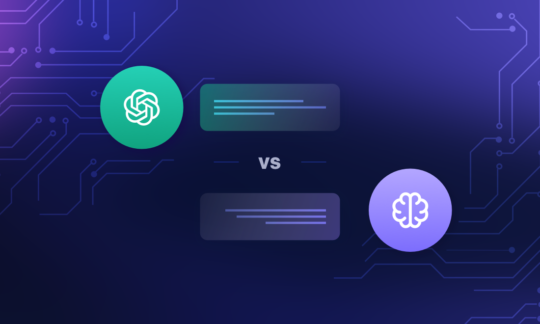Why Your Business May Need Skype for Business AI Chatbots
Table of contents
- What Are Chat Bots?
- AI Chatbots vs Rule-Based Chatbots
- Skype for Business Chatbots Use Cases
- Creating a Skype for Business Chatbot
- Rule-Based Chatbot Limitations
- Why You May Need AI Chatbots Instead of Rule-Chatbots
- Who Should Choose AI Chatbots Over Rule-Based Bots?
- AI Chatbots Basics
- Skype for Business Chatbots Best Practices
- Skype for Business Chatbots Examples
Our world is becoming increasingly automated. Thanks to advancements in AI, many repetitive tasks can be done without supervision– allowing businesses to focus on more pertinent issues. But what does that mean for Skype clients? According to a study, there are about 90,000 businesses that still use Skype for Business and may benefit from AI chatbots.
What Are Chat Bots?
A chatbot is a computer program that simulates human conversations whether through voice or plain text commands. Chatbots can understand input from users and can generate accurate responses, which helps businesses by automating repetitive tasks and consumers get information quickly.
AI Chatbots vs Rule-Based Chatbots
A rule-based bot operates from a single script and can answer simple questions with ease. Based on the input, they can only ever provide a single answer to a single query.
AI Chatbots (or business bots) on the other hand operate from multiple scripts, can learn from human input, and interact with users on more complex issues.
They can do this because they are built on NLP or Natural Language Processing. NLP allows for sentiment analysis which makes the user feel like the bot is understanding their queries – even if they ask open-ended questions, or use slang/colloquial language.
Skype for Business Chatbots Use Cases
Skype clients can leverage the power of conversational bots for multiple use cases. Let’s explore the ways that your business may integrate with chatbots:
24/7 Support
If you have customers in other time zones or can’t afford to pay someone to take the night shift – having support around the clock can be extremely useful. About 53% of buyers find waiting too long for replies the most frustrating part of interacting with businesses according to a recent study.
Internal Help Desk Report
You can boost your support agent’s productivity by handling FAQs quickly and effectively. With AI, you can even train your bot to understand the language of your specific industry and the different ways people ask questions. Teaching your bot IT or medical phrases can come in handy depending on your business.
FAQ Answers
For an event coming up, your customer service team can handle dozens or even hundreds of inquiries. But what if the number is in the thousands? Automating messaging around that information can free up time for your agents. Plus, questions are typically answered within seconds – so even your customers will be pleased.
Customer Engagement
Did you know that chatbot that assists customers as virtual assistants can increase booking rates by 25%? The expectation of an immediate response has grown over the years and plays a key part in engaging customers and keeping them happy.
Voice Assistance
With the increasing popularity of AI voice assistants like Alexa, Google Home, or Siri, everyone knows just how convenient it is to speak a command rather than type it out. Accenture did a study that shows how digital users prefer messaging platforms with a voice interface in addition to text.
Customer Onboarding
If a customer doesn’t know how a mobile app works, they are likely to get frustrated and may delete it. Integral to creating loyal customers is providing a seamless onboarding experience so customers can get questions answered fast.
Ordering and Refunding
Getting all the necessary information like credit card and mobile, shipping address, and name can easily be automated. Chatbots can handle simple return requests and show return policy information if needed in seconds.
Lead Generation
Through natural conversation, bots try to turn interested users into customers by making offers based on the user’s wants and needs. This approach is much better than pop-ups because most users actually find pop-ups ruin their user experience on the web.
Product Recommendations
If you run a retail store, you can make customers feel special by making personalised product recommendations. Tracking your customer’s journey ai bots can dig up information on the person’s preferences, interests, and needs.
Creating a Skype for Business Chatbot
Getting started with chatbots and AI technology may seem tricky but in fact, it doesn’t have to be that complicated. Most of the time you can simply have someone in your IT department do the work for you. In the case of implementing a Skype for Business AI bot, the resource on Microsoft’s website is a great place to start.
Here are some other considerations when implementing a chatbot:
- Define your business needs and pain points
- Make objectives and KPIs
- Choose chatbot type
- Choose communication channels
- Create your bot’s personality (dialog flow)
- Create a demo or PoC project
- Increase the scope of the chatbot’s work
- Measure and report
- Optimise
Be sure to avoid these common mistakes when implementing chatbots for your organisation as well.
Rule-Based Chatbot Limitations
When implementing a rule-based chatbot, there are some limitations you may need to consider, including:
Lack of Personalisation
Without NLP (Natural Language Processing), rule-based chatbots won’t be able to understand slang or technical terms. If you’re in medicine or IT, ai chatbots may be better because you can teach the bot words commonly used in your industry. Personalisation can mean personalised to the person as well as the industry.
Linear Responses
Only being able to provide answers your legal team provides (based on predefined sets of rules) the answers a rule-based bot can generate may be severely limited. If your client asked questions outside their preset understanding they will fail and need human intervention.
High Maintenance
Rule-based bots rely on explicit coding. It will do whatever you tell it to do within the code. If your organisation grows, so too will your bot need to be updated with new rules. The maintenance effort grows in step with business needs and may quickly outpace human capabilities.
Why You May Need AI Chatbots Instead of Rule-Chatbots
Rule-based chatbots can work for businesses in a variety of situations, but there are others where conversational bots may be needed, including:
Capable of Understanding Complex Conversations
if your company caters to a more technical audience, then your users may require a more sophisticated business bot capable of answering questions at a high level. For example, if you sell a mobile app, a financial service, or a technical product, then rule-based chatbots may not be enough.
Capable of Understanding Multiple Languages
If your business works with international clients, then the need to translate information to other languages may be needed. Even local dialects and individual phrases can be learned by AI if you have lots of data for them to work with.
Can Handle a Large Volume of Queries
If your business has hundreds of customers that are inquiring every day, then you may want to invest in a bot framework that is capable of handling a higher volume of chats.
Able to Operate 24/7
No matter what time zone your customers operate in, ai bots can respond to clients at all times of the day without human supervision.
Scaleable Learning
If you work in a dynamic industry that is fast-changing, then you may need AI to keep up with those demands. AI learns with each user interaction and can be taught various phrases that appear in your industry.
Who Should Choose AI Chatbots Over Rule-Based Bots?
The sophistication of conversational bots is useful to so many enterprises as they may want to effectively scale their customer support and internal communications. Here’s a list of enterprises that may benefit from AI chatbots:
Information Technology Companies
There are both internal and external applications for IT companies. Externally, you can free up time for your support agents when customers have troubleshooting issues. Internally, if any of your employees have questions, they can ask the Chatbot for assistance with those requests.
Computer Software Companies
Onboarding new customers means lots of questions may be directed at your support team and take up all their time. You can free up some of their valuable time to focus on other pertinent issues with conversational ai bots who can ask as an onboarding specialist to answer any questions they may have.
Marketing & Advertising
Helpful for lead generation and engaging customers who land on your website. The bot will be able to answer any questions your customer may have about your services at all hours of the night
AI Chatbots Basics
What’s NLP?
Natural Language Processing, or NLP, is the sub-branch of Artificial Intelligence that combines linguistics, computer science, and analysis, enabling machines to interpret speech and text and provide contextually appropriate replies. Its subsets include Natural Language Understanding and Natural Language Generation.
What’s NLU?
Natural Language Processing (NLP) is a field that blends linguistics, computer science, and data analysis. Machines are able to interpret speech and text in context, improving communication between humans and technology. NLP includes Natural Language Understanding and Natural Language Generation, which enable machines to draw valuable insights and create more effective interactions. This sub-branch of AI has the potential to revolutionize the way we communicate and interact with technology.
What’s NLG?
Natural Language Generation, a subset of NLP, uses Artificial Intelligence to produce impressive volumes of text, all derived from a specific dataset. Through this field, computers are able to generate written content that may seem almost indistinguishable from that produced by human authors. NLG is a dynamic and evolving area of study that pushes the boundaries of what we thought was possible in language and technology.
Skype for Business Chatbots Best Practices
If you’re planning on implementing Skype for Business Chatbots, be sure to follow these best practices for your business:
Augment, Not Replace
Automation certainly has its benefits when it comes to tasks like checking shipping statuses, but it’s important to remember that it won’t be able to provide the same personalized recommendations as a human employee. While concerns about job loss due to automation are valid, it’s important to approach it as a tool rather than a complete replacement for human workers. It’s true that some businesses may choose to cut costs by replacing employees with robots, but a well-run business can use automation to enhance the capabilities of their team rather than eliminate positions entirely. As with any tool, it’s all about how you use it – so make sure your approach to automation supports your employees and helps them work more efficiently.
Research, Experimentation, Testing, More Testing
Automation certainly has its benefits when it comes to tasks like checking shipping statuses, but it’s important to remember that it won’t be able to provide the same personalized recommendations as a human employee. While concerns about job loss due to automation are valid, it’s important to approach it as a tool rather than a complete replacement for human workers. It’s true that some businesses may choose to cut costs by replacing employees with robots, but a well-run business can use automation to enhance the capabilities of their team rather than eliminate positions entirely. As with any tool, it’s all about how you use it – so make sure your approach to automation supports your employees and helps them work more efficiently.
Keep It Simple and Think of Your Audience
As tempting as it may be to automate every aspect of your customer service process, it’s important to keep your audience in mind. For brands catering to seniors, replacing friendly customer service agents with a confusing phone menu may lead to customer alienation. It’s crucial to understand your customers and their expectations before implementing automation. Use it sparingly and in situations where it will truly benefit both the customer and the brand. By doing so, you can ensure a seamless, efficient, and satisfying customer experience.
Skype for Business Chatbots Examples
There’s a variety of ways that you can implement Skype for Business chatbots:
- Answer FAQ
- Service repetitive processes (bank transfers, debt collection, appointment reminders)
- Guide users through simple processes (filling out forms, etc)
- Classify issues and redirect to proper agent/division (like IVR on steroids)
- Gather sensitive data
- Lead a contest (on social media)
- Distribute resources (content marketing)
Thanks to SentiOne Automate rest API web services, you can provide seamless chatbot automation across all channels, platforms and existing infrastructure. Schedule a demo today to learn how to quickly implement a chatbot that your customers will love.



